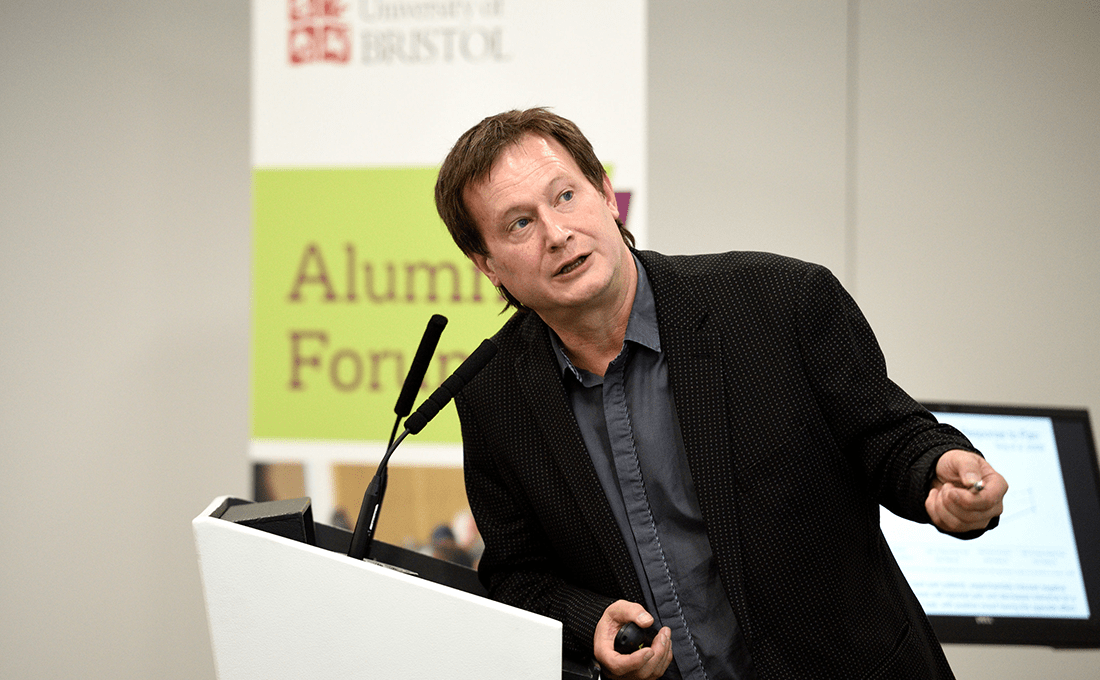
Emeritus Professor of Neurology and Paediatrics Dr Arthur Rose (MBChB 1957) tells Nonesuch why he still finds his alma mater inspiring.
Dr Arthur Rose first came to Bristol in 1951, and the University and the city have remained in his heart and mind ever since. Following an esteemed medical career – including winning the Lifetime Achievement Award of the Child Neurology Society – Dr Rose currently resides in New York City where he is still active at State University of New York (SUNY) Downstate Medical Center in Brooklyn.
‘As a child Holocaust survivor, and subsequently as a refugee from the communist regime in Poland, I have a debt of gratitude to the British people and to the University of Bristol, for the education I received there at no cost to me. The seven years I spent in Bristol, as a student and house physician, were some of the happiest of my life and I look back at that period with great pleasure and gratitude. While studying hard at Bristol I was also able to participate in the many social and sports activities offered by the Students’ Union. I made lifelong friends and took advantage of all opportunities that I could, including spending time as a visiting student at the Copenhagen Medical School and at St Bart’s in London. My Bristol degree opened many academic doors for me including at Harvard, Montreal Neurological Institute, Columbia University and the Albert Einstein College of Medicine.’
I am thankful for my Bristol education and grateful for the scholarship that paid for it.
At just 12 years of age Arthur lost his parents, aunts and uncles during the Holocaust. He and his sister only survived the war by being hidden by Christian friends of their parents. Eventually Arthur and his sister were able to join a group of Jewish orphans who were allowed to leave communist Poland and emigrate to the UK. The siblings went to stay with a relative in London. Having joined school in the UK with no English and his schooling prior to that ‘in a shambles’ due to the war, it is remarkable how dedicated and tenacious Arthur was about furthering his education. On leaving school in the UK at the age of 16 Arthur joined an importing business, but it didn’t inspire him. His relationship with two Polish relatives, a gynaecologist and a urologist, helped him decide on a career in medicine. With fierce determination Arthur applied himself to acquiring the necessary A-level grades in Physics, Chemistry and Biology by attending a summer cram course and a year of technical college. After multiple rejections Arthur was accepted by the University of Bristol Medical School where he was awarded full fees and a maintenance scholarship.
After completing his medical degree at Bristol Dr Rose worked as a senior house officer in a children’s hospital in London before travelling to the USA for further training. In Boston his interest in paediatric neurology flourished. After finishing his paediatric and neurology residency, and three postgraduate research fellowship years, Dr Rose was appointed to the faculty at the Albert Einstein College of Medicine in New York. There, his federally supported research focused on the neurological disorders of newborn infants caused by neurotoxic agents. In 1975 he was invited to organise the Division of Paediatric Neurology at the SUNY Downstate Medical Center in Brooklyn. He remained there as Professor of Neurology and Paediatrics for 40 years. Dr Rose is acknowledged as one of the leading experts in this area, both in terms of clinical research and as a clinician.
Since 2007, Dr Rose has funded an exchange programme for medical students, between the University of Bristol and SUNY Downstate. Each year one Bristol medical student gets to spend eight weeks at SUNY Downstate and one student from SUNY Downstate spends eight weeks at Bristol. One of the recent recipients Thomas Robb has told Nonesuch how much he valued the experience and what he learned about Dr Rose’s speciality of paediatric neurology.
In addition to funding the scholarship programme Dr Rose has also committed a legacy to support the Master of Research programme at Bristol. ‘I am delighted to be leaving a legacy for the MRes at Bristol. I find this programme to be highly innovative, well-structured and ideal for ambitious students interested in an academic career.’
Thomas Robb (BSc 2014, MBChB 2019)
‘Getting accepted onto Dr Rose’s paediatric neurology scholarship programme was a wonderful experience for me. There’s just no way I would have had this chance otherwise, I could never have funded it myself.
I’m so grateful for this opportunity and I was treated so well. I’d never been to New York either, so it was fantastic to be based there. It’s quite rare for a student from the UK to get to do American hospital visits and the US medical system is completely different.
I spent six weeks in paediatric neurology and two weeks in adult neurology and got to be involved in the day-to-day working life including seeing patients on the ward. While working with Dr Rose I saw rare things I’d never seen before. Paediatrics is always a puzzle because children cannot really explain what they’re feeling in the way that an adult can. You also need to work with the child’s family and their fears and expectations.
The teaching at SUNY Downstate was excellent. We had case studies to test our knowledge every morning for about an hour before we set off on ward rounds. Everyone there was so willing to teach and share knowledge. I learned so much because the staff there were so keen to work with me. I’ve really been encouraged to learn more, research more, read more and it’s confirmed my interest in neurology.
Dr Rose is a very inspiring person and passionate about people taking up paediatric neurology. I will try to replicate his kindness and generosity towards me, towards others I meet in life.’
You can join Arthur and others like him in supporting vital medical research and giving a gift in your Will by getting in touch with us today. Nicola Giblin Planned Giving Officer, Development and Alumni Relations Office University of Bristol, 1 Cathedral Square, Trinity Street, College Green, Bristol BS1 5DD. T: +44 (0)117 428 4411 E: nicola.giblin@bristol.ac.uk.



